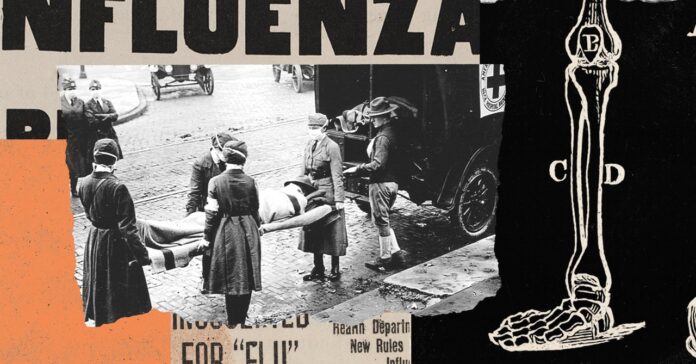Within the ultimate onerous days of Global Struggle I, simply two weeks sooner than global powers agreed to an armistice, a physician wrote a letter to a chum. The physician was once stationed at the United States Military’s Camp Devens west of Boston, a base filled with 45,000 squaddies making ready to send out for the battlefields of France. A quick-moving, deadly pneumonia had infiltrated the bottom, and the ward he supervised was once packed stuffed with desperately ill males.
“Two hours after admission they’ve the mahogany spots over the cheek bones, and a couple of hours later you’ll be able to start to see the cyanosis extending from their ears and spreading in all places the face,” he wrote to a fellow doctor. “It is just an issue of a couple of hours then till loss of life comes, and it’s merely a battle for air till they suffocate. It’s terrible.”
No person knew what was once slaughtering the lads, killing 100 an afternoon simply at Devens and greater than 57,000 by the point the ultimate army firms had been demobilized in 1919. It took years to take into account that the sickness was once the roaring go back of a light flu that had sprung up in Kansas the yr sooner than and traveled to Europe with the earliest US deployments, a crushing 2d wave that may sweep the arena.
The loss of life toll of the “Spanish” flu (which didn’t stand up in Spain however was once lined in its newspapers as a result of they’d no wartime censorship) counted no less than 50 million folks, time and again the recorded deaths from Covid-19. Amid that toll, the account of its attacks on Camp Devens has all the time stood out—now not only for the dread it embodies but additionally for the sufferers it describes. It’s assumed in drugs that infectious outbreaks preferentially kill the very outdated and the very younger, a curve that appears like a U whilst you plot ages and deaths in combination. However the mortality curve of the 1918 flu was once a W, with a center height of folks between 20 and 40—younger and wholesome, because the Devens army recruits would had been.
Ever since, the narrative of the 1918 flu has been that it was once a novel killer, taking down every age regardless of the state in their well being, and mysteriously maximum deadly to folks whose immune methods had been maximum tough. Now, despite the fact that, an research of skeletons of people that died in 1918 displays that tale will not be right kind. Their bones retain proof of underlying frailty, from different infections or malnutrition. That discovering may each rewrite the historical past of 1918 and impact how we plan for pandemics to return.
“This has a generalizable conclusion, which is that epidemics don’t strike neutrally, a bolt instantly,” says Andrew Noymer, a demographer and epidemiologist and affiliate professor at UC Irvine, who was once now not concerned within the paintings however research the interaction between tuberculosis and the 1918 flu. “They strike differentially, and people who find themselves worse off first of all are going to be even worse off on the some distance finish.”





 #shorts #shortsfeed #nature #youtubeshorts #iciness
#shorts #shortsfeed #nature #youtubeshorts #iciness